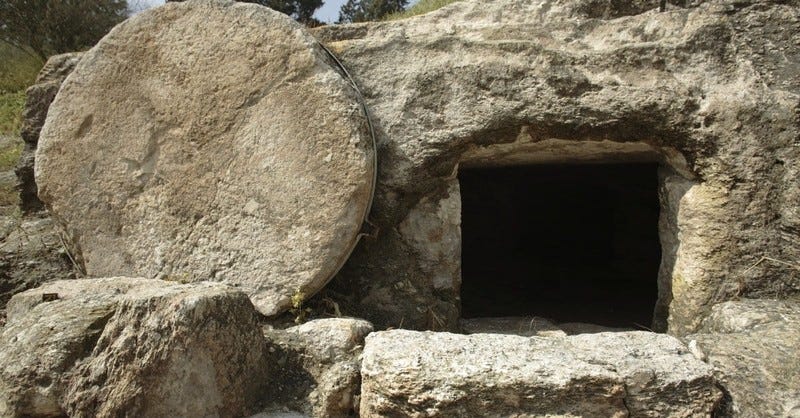What do a bunny, some eggs, and a rolling stone have in common?
They share one Sunday each Spring
One Sunday each Spring, children awaken to search for colorful eggs filled with candy left behind by a benevolent bunny. That same day, for millennia, a rolling stone has been celebrated by millions around the world (no, not Keith Richards). This is where the similarity ends. The bunny is fictional, though a fun fable for children, as is the ensuing sugar rush after his departure. The rolling stone, however, is real. It is a stone that was rolled away from the mouth of a cave - a cave that served as the tomb in which was laid the body of Jesus after He died a gruesome death on a cross.
Since at least the 1600s, this special day has been called Easter. The origin of that word and its use in reference to the day is questionable. Some say it comes from the name of the Sumerian goddess of fertility, Ishtar, which could explain the use of eggs in celebrating the holiday, as they often serve as a symbol of fertility. There is another fertility goddess from whose name Easter also may have come, the Celtic goddess Oestre. Another possible forerunner is the Germanic Spring goddess Ēostre (whose name in Old English was Ēastre). There are a number of other proposed origins, and frankly, none of them matter. The fact is, the term “Easter,” while it may aptly describe a festival celebrating a pagan fertility goddess, and for which the use of eggs is certainly appropriate. The word has, however, no biblical basis.
The day we celebrate the rolling away of the stone used to seal that ancient tomb was never called Easter at the time of the event, nor since, until 1611. In the King James version of the Bible, in the recounting of Herod persecuting Christians, we read the following about his plans for the apostle Peter: “And when he had apprehended him, he put him in prison, and delivered him to four quaternions of soldiers to keep him; intending after Easter to bring him forth to the people” (Acts 12:4). The word here translated “Easter” is the Greek word Πάσχα (Pascha), the equivalent of the Hebrew פֶּ֥סַח (Pesach), which means “Passover.” In the King James version, Pascha is actually translated “Passover” everywhere else it appears in the New Testament. In other translations, it is rendered “Passover” in Acts 12:4 as well.
What is my point in all this? For one, to help people understand that the day in Spring when Christians celebrate the empty tomb should not, at least by Christians, be called “Easter.” If we want to get truly OCD about it, based on Scripture, it should be celebrated the Sunday immediately following the Jewish Passover, as this would align with the biblical account. But back to the terminology, “Easter” does not in any way express that which we celebrate.
Jesus was hung on a cross at the Passover, then after His death, was taken down and laid in the tomb over the entrance of which a large stone was placed. Sunday morning, the stone was rolled away, and His followers found the tomb empty. Instead, they experienced an angelic appearance and were told that He would not be found among the dead, for He had risen. This is what we celebrate - the resurrection of Jesus, His overcoming death, because it was Jesus “who was delivered over because of our transgressions, and was raised because of our justification” (Rom. 4:25).
That’s right. This man Jesus was sacrificed as a lamb at the Passover, much like the Hebrews in ancient Egypt were instructed by God to sacrifice lambs at the original Passover, that the angel of death might pass over their homes. As Paul states, “for Christ our Passover also has been sacrificed” (1 Cor. 5:7b). Peter reminds us that this is how we are redeemed:
If you address as Father the One who impartially judges according to each one’s work, conduct yourselves in fear during the time of your stay on earth; knowing that you were not redeemed with perishable things like silver or gold from your futile way of life inherited from your forefathers, but with precious blood, as of a lamb unblemished and spotless, the blood of Christ. - 1 Pet. 1:17-19
This day, this Resurrection Day, is truly a day to celebrate. It is not about a hypothetical hare hopping around stashing sweet-filled shells - it is about salvation, salvation we do not deserve, but which God gives freely. For this reason, to those who believe, I joyfully say, “He is risen!” To those who do not believe, I also joyfully say, “He is risen!” This salvation is offered freely, but it is received only through faith. As the apostle Paul wrote, “if you confess with your mouth that Jesus is Lord and believe in your heart that God raised him from the dead, you will be saved. For with the heart one believes and is justified, and with the mouth one confesses and is saved.” (Rom 10:9-10).
Happy Resurrection Day!



Jesus said to her, “I am the resurrection and the life; he who believes in Me will live even if he dies, and everyone who lives and believes in Me will never die. Do you believe this?” - John 11:35
Another thing I don’t understand is the rabbit and egg concept. I’m sure at some point one of them “godesses” was depicted with long bunny like ears, combined with eggs for the devotion to her, would explain it. But why hasn’t enough understood none of this makes since?
Instead I choose to treat today like Thanksgiving. Because the one thing I am most thankful for is the love of God, to sacrifice, and allow the sacrifice, of his only son, for the transgressions of humankind.